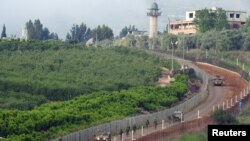The U.N. Security Council warned Thursday that violations of the cease-fire agreement between Lebanon and Israel could lead to a new conflict and urged international support for Lebanon’s armed forces and their stepped up deployment in the south and at sea.
The council’s warning against “a new conflict that none of the parties or the region can afford” came in a resolution adopted unanimously extending the mandate of the U.N. peacekeeping force in southern Lebanon known as UNIFIL until Aug. 31, 2019.
Council members urged “all parties” to exercise “maximum calm and restraint and refrain from any action or rhetoric that could jeopardize the cessation of hostilities or destabilize the region.”
Peacekeepers since 1978
UNIFIL was originally created to oversee the withdrawal of Israeli troops after a 1978 invasion. The mission was expanded after a 2006 war between Israel and Hezbollah militants so that peacekeepers could deploy along the Lebanon-Israel border, to help Lebanese troops extend their authority into their country’s south for the first time in decades.
The French-drafted resolution again urged all countries to enforce a 2006 arms embargo and prevent the sale or supply of weapons to any individual or entity in Lebanon not authorized by the government or U.N. force known as UNIFIL, an implicit criticism of the suppliers of weapons to Hezbollah.
Rodney Hunter, the U.S. Mission’s political coordinator, told the council that Hezbollah, with Iran’s help, “has grown its arsenal in Lebanon in direct threat to peace” along the boundary with Israel “and the stability of all of Lebanon.”
Hunter said 12 years after the council imposed an arms embargo, “it is unacceptable that Hezbollah continues to flout this embargo, Lebanon’s sovereignty, and the will of the majority of Lebanese people.”
Lebanese forces
Israel and Lebanon are still technically at war and the resolution reiterates the council’s call for Israel and Lebanon “to support a permanent cease-fire and a long-term solution.”
The council also stressed “the necessity of an effective and durable deployment of the Lebanese Armed Forces in southern Lebanon and the territorial waters of Lebanon at an accelerated pace.”
It called for UNIFIL, which has more than 10,000 troops deployed in southern Lebanon, and the Lebanese military to analyze the country’s ground forces and maritime assets.
The council also called for the Lebanese government “to develop a plan to increase its naval capabilities ... with the goal of ultimately decreasing UNIFIL’s Maritime Task Force and transitioning its responsibilities to the Lebanese Armed Forces.”
France’s deputy U.N. ambassador Anne Gueguen stressed that “only the presence of the Lebanese state and its armed forces will ensure security ... and create the conditions of lasting stability in the south of Lebanon, and along its territorial waters.”
Political solution
The Security Council also commented on the current political situation in Lebanon.
Nearly four months after the country held its first general elections in nine years, politicians are still squabbling over the formation of a new government amid uncertainty over a long stagnating economy, struggling businesses and concerns over the currency.
The Security Council welcomed the holding of elections and the country’s progress toward reactivating government institutions, and called for the formation of a new Lebanese government “without further delay.”









